
Battle of Britain
A defeated, retreating British Expeditionary Force, the miraculous evacuation at Dunkirk, the Battle of Britain, the evacuation to America and the Blitz--you couldn't make the story of 1940 dull if you tried. But even the best material has to be threaded into a manageable narrative, and Tim Clayton and Phil Craig don't disappoint. Finest Hour is never less than engaging, and frequently does rather better. On the jacket blurb, Clayton and Craig seem keen to establish their bona-fides as heavyweight historians and claim to have uncovered a "fresh and controversial" account of the political intrigues and betrayals of the period. There's actually nothing really controversial on offer--at least nothing that hasn't been aired elsewhere. If this comes as a disappointment to the authors, it needn't to the reader, because we are left with something just as, if not more, valuable, namely, an accessible layperson's ride through the political and military maneuverings. Clayton and Craig are particularly good at guiding us through the early days of Churchill's premiership. Read most populist accounts and you would imagine that the moment Churchill took office, the bulldog spirit took over and the plucky Brits stood resolute. Not so. The case for appeasement was still being made within the Cabinet up until the evacuation of Dunkirk, as Lord Halifax had a great deal of support for his conciliatory views. Bizarrely, the thing that ultimately counted against him was his title--it was felt the Upper House should not hold sway over the Commons. Where this book excels, though, is in the quality of its eyewitness testimonies. Many books have previously used this technique of threading narrative with the first person, but few have found such eloquent speakers. Most eyewitnesses fudge the difficult bits with remarks such as "It was hell." Clayton and Craig's witnesses don't pull their punches. We hear from one Brit who shot a German officer in cold blood and had nightmares for ages afterward. We hear from the sailor who saw his gunner decapitated. We experience the stench of burnt flesh following the shelling of an ambulance. In short, we are spared nothing. It may not be comfortable reading, but it cannot be ignored. Sixty years after the men and women in these pages fought and died, there's a tendency for the rest of us to take the freedom they gave us for granted. They deserve a better memorial than a slow fading into nothingness. This book ensures they get it.